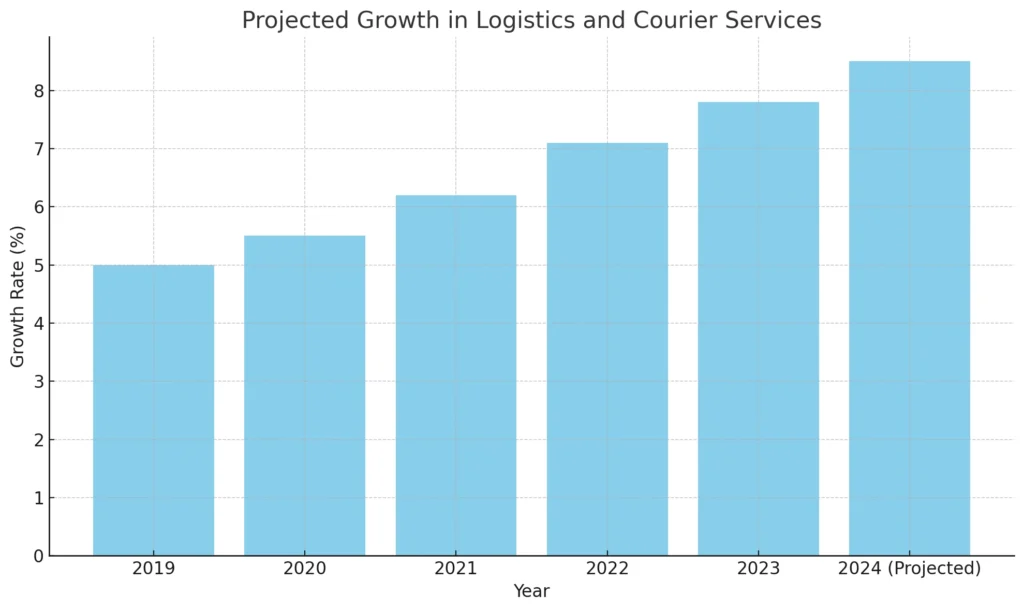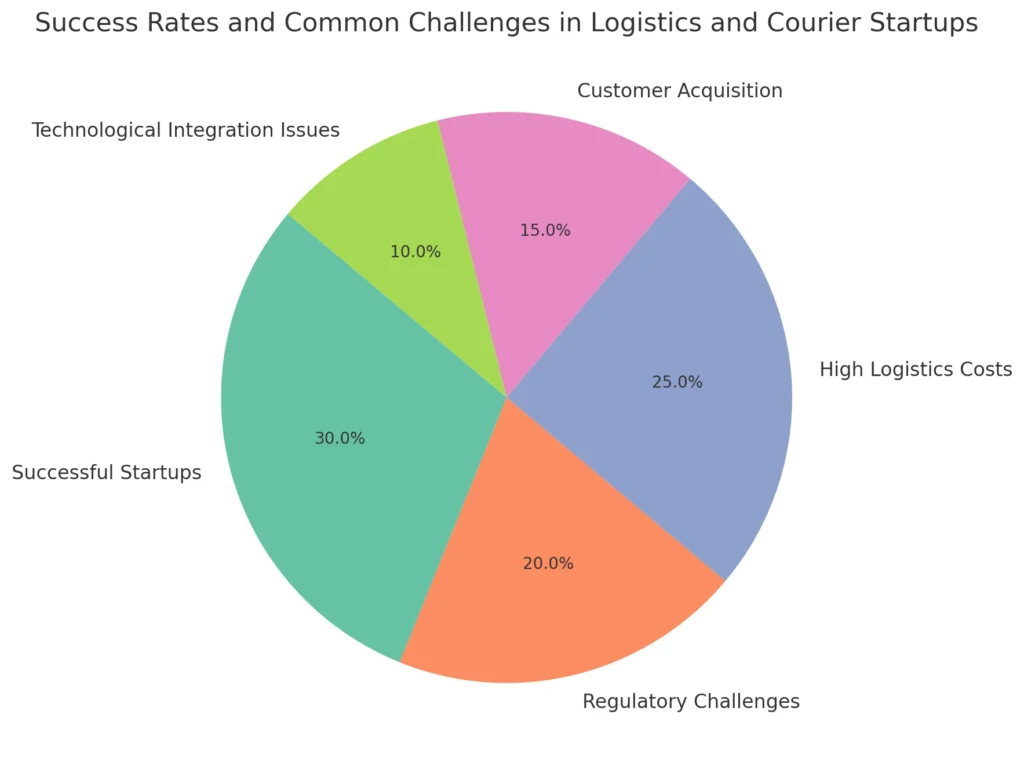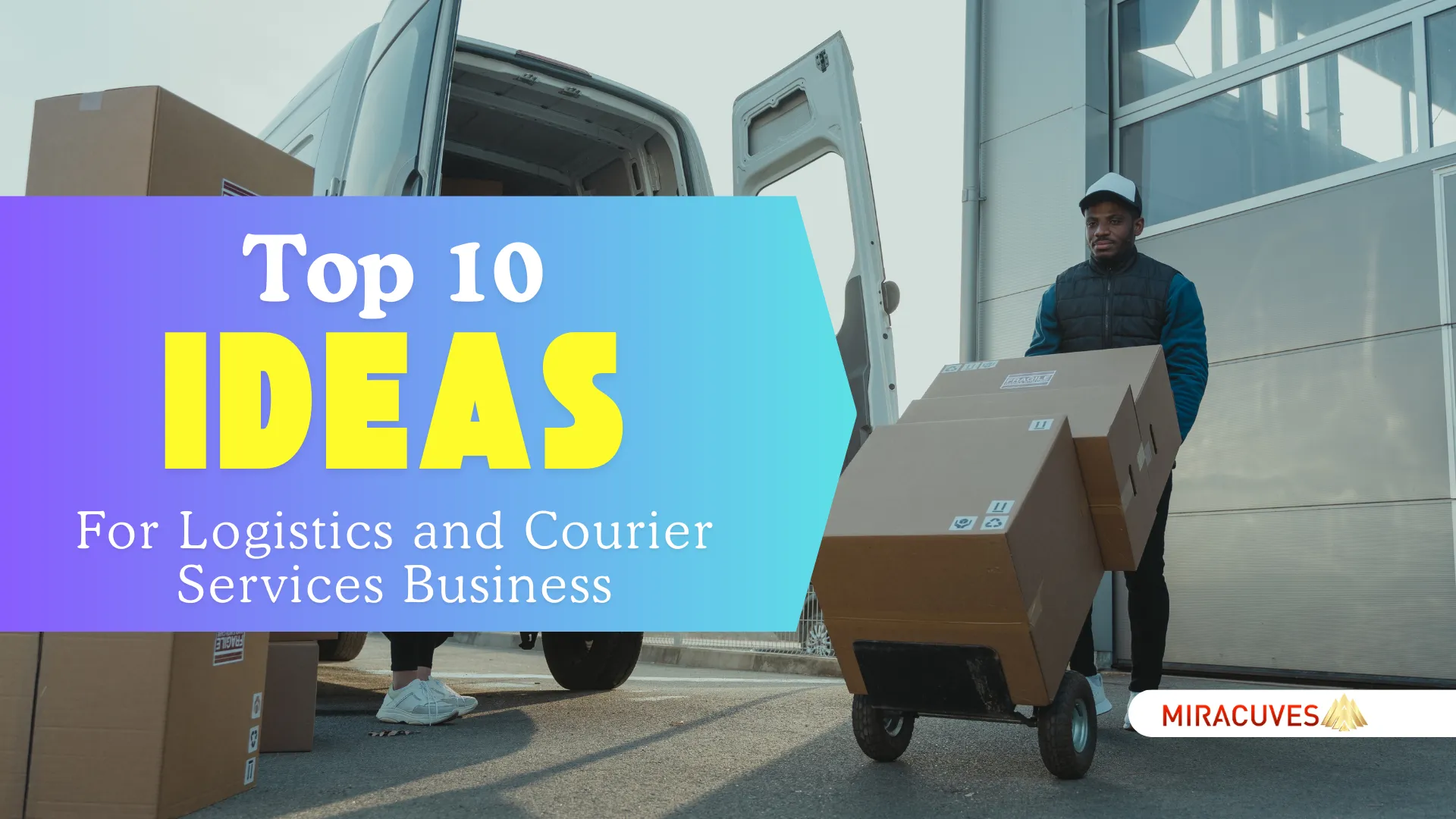In today’s fast-paced world, logistics and courier services have become indispensable, driving global commerce and meeting ever-growing consumer demands. From e-commerce deliveries to intricate supply chain management, the industry has evolved into a crucial backbone supporting businesses of all sizes. As consumer expectations continue to rise and technology enhances delivery speed and accuracy, there’s no better time to dive into the logistics and courier sector.
Whether you’re an aspiring entrepreneur or a seasoned business owner seeking expansion, this guide will introduce you to profitable startup ideas within logistics and courier services. Each idea is tailored to align with current industry trends, from last-mile delivery solutions to green logistics, equipping you to build a successful venture in this booming field.
Why Choose Logistics and Courier Services?

The logistics and courier industry is experiencing phenomenal growth, driven by digital commerce, globalized supply chains, and an on-demand economy that prizes speed and convenience. With e-commerce sales skyrocketing and businesses needing swift, reliable delivery solutions, this industry offers substantial revenue potential and long-term stability. Logistics and courier services don’t just connect packages with people—they link businesses to customers, build trust, and create value in every transaction.
For budding entrepreneurs, the appeal of this sector lies in its versatility and scalability. From small-scale delivery operations to large-scale freight management, logistics offers an array of entry points for startups, allowing you to tailor your business to your resources and target audience. This adaptability makes the industry an attractive option for entrepreneurs looking to break into a market that is both essential and in high demand.
Current Trends and Future Opportunities in Logistics and Courier Services
The logistics and courier industry is undergoing a rapid transformation, fueled by technological advancements and evolving consumer expectations. Emerging trends like last-mile delivery innovations, eco-friendly logistics, and smart warehousing are shaping the industry and presenting exciting opportunities for startups. Today’s consumers want fast, reliable, and sustainable deliveries, and businesses that can meet these demands are positioned to thrive.
One of the most influential trends is the rise of last-mile delivery solutions, aimed at getting packages to customers faster and more efficiently, often within hours. Companies are increasingly adopting technology like drones, automated delivery vehicles, and optimized routing software to meet this demand. Another growing opportunity lies in green logistics. With environmental concerns on the rise, many companies are investing in electric vehicles, carbon-offset initiatives, and eco-friendly packaging to attract environmentally conscious consumers.
Additionally, the surge in e-commerce has increased demand for warehousing and inventory management solutions. Future opportunities include automated warehouses, real-time tracking technology, and AI-driven inventory management. Startups focusing on these trends can find profitable niches, gaining a competitive edge in a market with high growth potential.
For more on how green logistics is shaping the future, visit this resource on sustainable logistics practices.
| Trend/Technologie | Beschreibung | Auswirkungen | Chance für Startups |
|---|---|---|---|
| Last-Mile Delivery | Innovations in delivering packages directly to the customer’s location | Faster delivery times, convenience | Drones, autonomous vehicles, optimized routes |
| Green Logistics | Eco-friendly initiatives like electric vehicles and carbon offset programs | Reduced carbon footprint, appeal to eco-conscious consumers | Electric fleets, sustainable packaging solutions |
| Smart Warehousing | Automated and AI-driven inventory management and storage solutions | Increased efficiency, reduced costs | AI-powered warehouse management, robotics |
| Echtzeit-Tracking | Technology that provides live package tracking for customers | Higher customer satisfaction | GPS-based tracking solutions, mobile apps |
| Omnichannel Logistics | Integrating various sales channels into a unified fulfillment strategy | Consistent customer experience | Multi-channel order management software |
| Prädiktive Analysen | Using data to forecast demand and optimize delivery routes | Cost savings, improved efficiency | Analytics tools, machine learning algorithms |
Top 10 Ideas for Logistics and Courier Services Business Startups
Entering the logistics and courier services industry offers diverse opportunities to cater to unique market needs. Here are ten profitable startup ideas, each designed to meet modern-day consumer expectations and leverage current industry trends.
| Geschäftsidee | Gründungskosten | Zielmarkt | Gewinnpotenzial |
|---|---|---|---|
| Same-Day Delivery Service | Mäßig | E-commerce, grocery, pharmacies | Hoch |
| E-Commerce Fulfillment Center | Hoch | Online stores, SMEs | Hoch |
| Green Logistics Solutions | Hoch | Eco-conscious brands, urban areas | Mäßig bis hoch |
| Last-Mile Delivery Service | Mäßig | Retailers, food delivery, e-commerce | Hoch |
| Cold Chain Logistics | Hoch | Pharmaceuticals, food suppliers | Hoch |
| Freight Brokerage | Niedrig | Manufacturers, retailers, exporters | Mäßig bis hoch |
| On-Demand Courier Service | Mäßig | Professionals, medical, legal | Hoch |
| Logistics Consultancy | Niedrig | SMEs, startups, manufacturers | Mäßig |
| Reverse Logistics | Mäßig | E-commerce, manufacturers | Mäßig |
| Medical Courier Service | Mäßig bis hoch | Hospitals, labs, clinics | Hoch |
1. Same-Day Delivery Service
- Warum: With rising customer expectations, same-day delivery is in high demand.
- Startanforderungen: A reliable fleet, local partnerships, efficient routing software.
- Zielmarkt: E-commerce retailers, grocery stores, pharmacies.
- Geschätzte Kosten: Moderate, based on fleet size and technology.
2. E-Commerce Fulfillment Center
- Warum: E-commerce growth drives the need for dedicated fulfillment solutions.
- Startanforderungen: Warehousing space, inventory management software, staff.
- Zielmarkt: Online stores, small and medium businesses.
- Geschätzte Kosten: High due to real estate and equipment.
3. Green Logistics Solutions
- Warum: Consumers are prioritizing sustainability.
- Startanforderungen: Electric or hybrid vehicles, eco-friendly packaging.
- Zielmarkt: Eco-conscious brands, urban customers.
- Geschätzte Kosten: High initially, with potential savings on fuel.
4. Last-Mile Delivery Service
- Warum: Last-mile delivery is crucial for customer satisfaction.
- Startanforderungen: Fleet management, route optimization software.
- Zielmarkt: Retailers, food delivery services, e-commerce businesses.
- Geschätzte Kosten: Moderate, scalable with demand.
5. Cold Chain Logistics
- Warum: Increasing demand for temperature-sensitive deliveries, especially in healthcare.
- Startanforderungen: Temperature-controlled vehicles, tracking technology.
- Zielmarkt: Pharmaceutical companies, food suppliers.
- Geschätzte Kosten: High due to specialized equipment.
6. Freight Brokerage
- Warum: Connects shippers and carriers, providing logistical support.
- Startanforderungen: Industry knowledge, digital platform for connecting clients.
- Zielmarkt: Manufacturers, large retailers, import/export businesses.
- Geschätzte Kosten: Low initial costs, mainly technology and marketing.
7. On-Demand Courier Service
- Warum: Serves businesses needing flexible delivery options.
- Startanforderungen: App-based booking system, small fleet.
- Zielmarkt: Professionals, legal services, medical deliveries.
- Geschätzte Kosten: Moderate, depending on fleet size.
8. Logistics Consultancy
- Warum: Growing businesses seek guidance in logistics efficiency.
- Startanforderungen: Expertise, digital consulting tools.
- Zielmarkt: SMEs, startups, manufacturers.
- Geschätzte Kosten: Low, primarily focused on marketing.
9. Reverse Logistics
- Warum: With e-commerce returns increasing, reverse logistics is crucial.
- Startanforderungen: Efficient tracking system, warehousing for returns.
- Zielmarkt: E-commerce, manufacturers.
- Geschätzte Kosten: Moderate, scalable based on client size.
10. Medical Courier Service
- Warum: Critical for transporting medical supplies and samples.
- Startanforderungen: Specialized handling, fast delivery options, insurance.
- Zielmarkt: Hospitals, labs, clinics.
- Geschätzte Kosten: Moderate to high, depending on specialized equipment.
Beispiele aus der Praxis
Real-world success stories and case studies provide valuable insights for startups aiming to enter the logistics and courier industry. By examining the paths of established companies and innovative startups, new entrants can understand key success factors, potential challenges, and the strategic adjustments necessary to thrive in this competitive field.
For example, companies like DHL Und FedEx continue to dominate by leveraging advanced technology in package tracking, efficient logistics management, and green initiatives. DHL’s carbon-neutral shipping options and investment in electric delivery vehicles resonate with environmentally conscious customers and highlight a profitable path in green logistics. Meanwhile, FedEx has been a pioneer in fast delivery networks and flexible shipping options, setting high standards for startups aiming to provide same-day or last-mile services.

On the other end of the spectrum, small-scale courier services like Postmates Und GoPuff showcase the power of focusing on last-mile delivery within specific markets. By catering to food, grocery, and convenience items, these companies have captured substantial market share in urban areas, providing reliable and rapid delivery on-demand.
These examples emphasize that whether a startup chooses to scale globally or specialize locally, understanding customer expectations, investing in technology, and staying adaptable are critical for growth and resilience.
Mistakes to Avoid When Starting a Logistics and Courier Business
Starting a logistics or courier business is exciting, but common pitfalls can quickly derail even the best intentions. Understanding these mistakes can help new business owners avoid costly setbacks and increase their chances of building a profitable venture.
1. Neglecting Market Research
- Many startups jump into the industry without fully understanding their target market’s needs or the competitive landscape. Failing to conduct market research can lead to wasted resources and misaligned business strategies. Startups should identify their niche, assess demand, and analyze competitor strengths and weaknesses to position themselves effectively.
2. Underestimating Operational Costs
- Operational costs in logistics are high, from vehicle maintenance to fuel and warehouse space. Many new businesses underestimate these costs, which can strain budgets early on. Accurately projecting operational expenses, factoring in fluctuations like fuel price changes, and setting aside contingency funds are critical.
3. Ignoring Technology Integration
- Efficient logistics relies heavily on technology, from GPS tracking and route optimization to inventory management. New businesses that overlook technological investment risk inefficiencies, delays, and lower customer satisfaction. Prioritizing affordable yet effective tech solutions can streamline operations and keep customers happy.
4. Lack of Clear Branding and Customer Service Strategy
- In a competitive market, building a recognizable brand and focusing on excellent customer service are essential. Startups often make the mistake of overlooking customer feedback or lacking a clear brand identity. Businesses that prioritize customer service and build a trusted brand are more likely to secure repeat customers.
5. Non-Compliance with Regulations
- Logistics involves various regulations, from vehicle compliance and driver safety to data protection for customer information. Ignoring these can lead to legal complications, fines, or business suspension. Staying up-to-date with regulatory changes and ensuring compliance is key to long-term success.
Stay updated on logistics regulations with this guide from the Department of Transportation.
| Häufiger Fehler | Beschreibung | Preventive Measures |
|---|---|---|
| Neglecting Market Research | Entering the market without understanding demand and competitors | Conduct thorough market research and identify a niche |
| Underestimating Operational Costs | Not accounting for high costs like fuel, maintenance, and warehousing | Budget accurately and set aside contingency funds |
| Ignoring Technology Integration | Failing to invest in technology for efficient operations | Implement GPS, route optimization, and inventory software |
| Lack of Branding and Customer Service | Overlooking the importance of brand identity and customer satisfaction | Develop a clear brand and prioritize customer feedback |
| Non-Compliance with Regulations | Ignoring legal requirements can lead to fines and business disruption | Stay informed on regulations and ensure full compliance |
Warum sollten Sie bei Ihrem nächsten Projekt auf die Lösungen von Miracuves vertrauen?
Choosing the right partner for your logistics and courier business startup can make all the difference in ensuring a smooth, successful launch. Miracuves Solutions is dedicated to supporting businesses with a unique blend of innovation, expertise, and commitment to client success. Here’s why Miracuves Solutions stands out as the partner of choice:
- Proven Expertise in App Solutions
Miracuves Solutions brings years of experience in crafting specialized app solutions tailored to the logistics and courier sector. Our deep industry knowledge allows us to develop solutions that enhance efficiency, from real-time tracking to route optimization, ensuring your business runs at peak performance. - Efficient and Cost-Effective Development
We understand that startups often operate within strict budgets, so Miracuves Solutions is committed to providing cost-effective solutions without compromising quality. With our streamlined approach, you’ll gain access to top-tier technology at a fraction of the standard development cost, enabling you to allocate resources effectively across your business. - Client-Focused Success
At Miracuves Solutions, we prioritize client success by offering ongoing support, customized solutions, and a dedication to meeting your business goals. We work closely with each client to understand their unique needs, providing tailored solutions that help them achieve a competitive edge in the logistics and courier market.
With Miracuves Solutions, you gain a partner who understands the logistics industry inside and out, equipped to help your startup succeed in a fast-paced, dynamic market.
Abschluss
Starting a successful logistics and courier business requires insight, strategy, and the right resources. With the industry’s rapid growth and diverse opportunities, entrepreneurs have the potential to build thriving businesses by focusing on customer needs, adopting smart technologies, and staying adaptable to market changes. Each idea explored in this guide is designed to leverage current trends, offering practical and profitable ways to enter this dynamic field.
From understanding industry trends to avoiding common mistakes and choosing reliable partners, every step counts. With careful planning and the right guidance, you can establish a strong foundation and begin making an impact in the logistics and courier sector. The journey from startup to success is within reach, and now is the perfect time to take the first step.
FAQs
What are the most profitable logistics startup ideas?
Some of the most profitable logistics ideas include last-mile delivery, e-commerce fulfillment centers, and medical courier services. These niches are growing rapidly and offer strong demand and high-profit potential.
How much does it cost to start a small courier business?
Startup costs vary but can range from a few thousand dollars for an on-demand courier service to higher costs for specialized services like cold chain logistics. Costs depend on fleet size, technology needs, and target market.
What technology is essential for a logistics startup?
Essential technologies include GPS tracking, route optimization software, and inventory management systems. These tools improve efficiency, reduce delivery times, and enhance customer satisfaction.
How can I compete with large logistics companies?
Start by focusing on a specific niche or local market, offering excellent customer service, and adopting cost-effective technology. Personalized service and reliability can help you build a strong client base.
What are the main challenges in the logistics industry?
Major challenges include high operational costs, regulatory compliance, and competition from established players. Startups should budget carefully, stay updated on regulations, and focus on a unique selling point to stand out.





























































